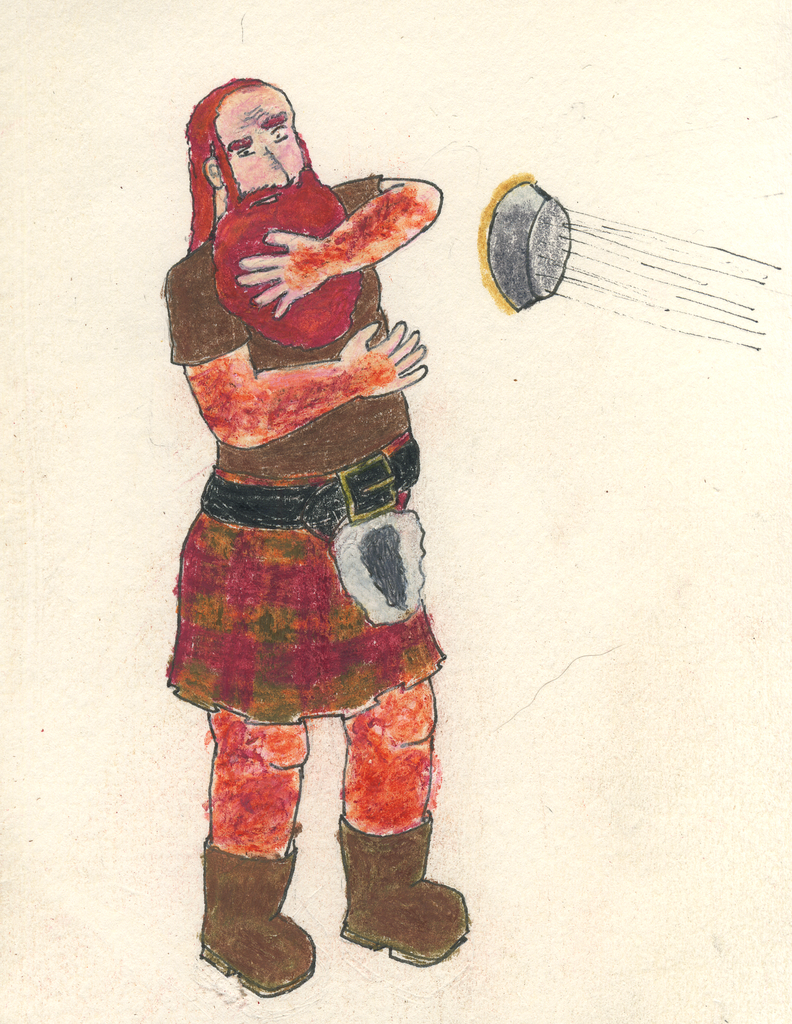
"I didnae ken!": A Scotsman being hit by a pie: Adam Cuerden, 2008
Death, you’re more successful than America,
even if we don’t choose to join you, we do.
I’ve just become aware of this conscription
where no one’s marble doesn’t come up;
no use carving your name on a tree, exchanging vows
or not treading on the cracks for luck
where there’s no statistical anomalies at all
& you know not the day nor the hour, or even if you do
timor mortis conturbat me. No doubt we’d
think this in a plunging jet & the black box recorder
would note each individual, unavailing scream
but what gets me is how compulsory it is --
‘he never was a joiner’ they wrote on his tomb.
At least bingeing becomes heroic & I can see
why the Victorians
so loved drawn-out death-bed scenes:
huddled before our beautiful century, they knew
what first night nerves were all about.

Zeus: Portrait of a God (Portrait of John Forbes): Ken Searle, n.d.; photo by Watters Gallery Sydney (via Jacket 3, April 1998)

John Forbes: photo by John Tranter, 20 July 1990 (via Jacket 3, April 1998)
John Forbes (1950-1998): Death, an Ode, from The Stunned Mullet, 1988
This post suggested by the Australian poet John Tranter, a friend of John Forbes, who writes (13 March 2012), re. the previous post (William Dunbar: Lament, When He Was Seik): "A faint echo of Dunbar, in a poem by the late John Forbes..."
ReplyDeleteThe top illustration -- described in 2008 by its author, Adam Cuerden (at the time an Edinburgh biology student) as "something completely different: quick drawing of a Scotsman and a pie, made for a friend's birthday. Watercolour pencil and ink." -- came to mind re. a comment on that same post by dalriada9.
Tom Clark, Tom Clark, your mind is that pie--I'm trying to keep up with (thanks). Rue barbed with vanilla ice cream I think.
ReplyDeleteThanks for posting that, Tom.
ReplyDeleteJohn Tranter
Susan Anderson, Susan Anderson,
ReplyDeleteIt's been pouring for forty hours
And forty hours more
And it's not showing signs of stopping
Susan Anderson, Susan Anderson
Traffic lakes and rooftop pounding
I've been saying,
"Unless some kind Soul wanders on
To share this private pie
Of barb and rue ice cream
I'm going to have to give it up, drown
My Bloody private Scotland,"
Susan Anderson!
John, that makes two Pacific Ocean landmasses
ReplyDeleteWhere the inhabitants appreciate John Forbes
And all the rest must settle for cake not pie
As they are perfect asses
And on a bit more, er, semi-serious note...
ReplyDeleteOn the poetry of John Forbes, from an obit by Philip Mead in Australian Humanities Review, February 1998:
"Forbes uses the raw material of a version of contemporary Australian speech to construct a poetic voice that is both distinctive and highly self-conscious. In fact it doesn't operate like "a voice" at all. The tension and sudden tone-shifts in Forbes's poetic language are produced by his sense that everyday life, via the media more often than not, overloads us with evidence of the bloated and sutured body of private and public discourse.
"In this context, Forbes thought of poetry as a kind of electric charge to be applied to the living-dead tissue of everyday language. You could throw the worst of infotainment-speak or CNN misinformation at Forbes and he'd turn it around and throw it back as poetry. Living in the midst of a necrotic discourse, Forbes felt compelled to fashion poems that were as mettlesome and invasive as possible. Hence his deadly use of parody and a kind of mock-Svengali sending-up of any quick resort to the representation of affect; hence also some of the linguistic pratfalls he uses for comic effect. But it needs to be said straight away that in all this there is no moral economy for Forbes. Rather than insisting on "purifying the language of the tribe" Forbes is all in favour of the demotic, the adulterated, the impure, whatever the everyday throws up, or spews out. He is taken up with the alibis of art, rather than its truth or lies.
"Forbes's poems work, often, by arranging strings of potentially lyric and narrative phrases/sentences, of varying length, which are then switched or subverted by shifts into the non-lyrical and the non-narrative. The skill of the form is in the way he wrong-foots or deliberately leads the reader on with a certain string of imagery, affect or narrative, which is at some point undercut with a cynical or exaggeratedly rhetorical gesture, or -- no possibility is ruled out -- a suddenly serious and plangent interjection.
"...Forbes hits the remote control every line or half line and the reader is switched onto another channel, where just about everything, from the production values to the language used, are different from the previous channel. But the overall medium -- the poem, that is -- remains a constant presence for the reader. In that sense, for all their denseness of particularity and their myriad references to the ephemera of everyday life, Forbes's poems work ultimately as substanceless form. In that sense, they are an antidote to the kind of substance abuse practised by those writers who use poetry to recycle neat and/or pre-existing themes, subjects and content."
_
And further from the astute John Tranter:
ReplyDelete"I feel Forbes's distinctiveness is partly due to his clear-eyed cynicism, and partly due to his Australian laconic style, both derived from the same bottle of Aqua Vitae, perhaps, or mother's milk."
re Philip Mead's obit and Tranter's most trenchant comment, all I can say is "I'll drink to that"--and for your intro to Forbes.
ReplyDeleteTom Something silly for your own "private Scotland" but NOT for publication here or anywhere !!!!!!
ReplyDeleteCrashing
in waves on Orkney’s shore
as herring herders through a storm
the bloody Vikings to the door
beating it like a huge tambour
where huddled bands in peaty swarm
raise music and their drinking arms
Vassilis,
ReplyDeleteIf only those shotglass size drops cannonading down on the battered roof of our hutch here in the Highlands right now (a foot of rain since Monday!) were Aqua Vitae, the dead might rise up to enjoy the music...
dal,
You ARE the music, and if and when those Viking storm troopers manage to slog through the bog as far as this door, they will hear that torrent beating like a tambour on the calcified thatch, feel right at home with the sodden company, and raise their overtaxed drinking arms to you... before exterminating us all.
(I hope you didnae mean to suggest that leaving that wonderful little poem here in a private comment to be seen only by the resident gremlins might by any stretch constitute publication -- fear not, those few stray souls who frequent this cave are required to shed their memories at the door, so any word said is immediately as good as forgotten. "What's that you said?" But at the same time of course, there also exists a handy little spanner which can make anything and anything disappear in an instant, poof! should you so please. In fact that's exactly what the Great Doom-Pie-Throwing Scotsman in the sky can, and surely one day before long WILL also do, as soon as these futile little memento mori manoeuvres begin to lose their diversionary efficacy... or has that already happened?!)
Ok Tom just to prove that I can also be scholarly and serious … Here is a loose translation of my own from Scots gaelic of a page of writing from a biography of the 14th Century Orcadian poet Han Var, an important figure in the culture of that island.
ReplyDeleteWe can only guess at how rich and illuminating the complete manuscript would have been.
Han Var, disliken as he was of Druriodama, hes wuncewife,
was a prophet of the decentest dozendest.
In which todoodling, out of ‘Calomnequiller's Pravities’,
and from the sourface of this earth,
that Austral plain he had transmaried himself to
so entirely spoorlessly - a mother of a book conceived
with a dustwhisk tabularasing his obliteration
done upon her involucrum,
tickling the speculative to all but opine.
Which of us but remembers now his once teacher,
the rarevalent and hornerable Fratomistor Nawlanmore?
Toaster to the quaintesttest of yarnspinners, treu and troster.
Sodality Director to The Queen of Ir.
A eupeptic Viceflayer, a barefaced prater, to whose
palpitating pulpit sinning society sirened - became
so enthusiastically an objectionable ass who cockaded
a Raffles Ticket on his hat which he wore all to one side.
That same snob, fortunately and semiprivately
convicted of malpractices, fully several yearschaums riper,
on that redletter morning on maynoon Jovesday . . . . . . . . . .
(To misquote Levey: “Had he [Han Var] merely condensced, he might have
been a redivivus of paganinism, but the hobo in him (who
possessed a large amount of the humoresque)
transtuled his funster's latitat to its finsterest interrimost.]
Dal,
ReplyDeleteWell, all I can say is, your lineage is the beneficiary of your brilliance.
Dalriada (satellite view)
That (Antrim, Ulster) was not "my people" (as they used to say), though, and thus strictly speaking none of my affair.
But still.
Re. things Orcadian, check out these bits if/when you get time.
Jennifer Wrigley: The Longhope Lifeboat Disaster (2007)
The Wrigley Sisters perform at the Reel in Kirkwall, New Years Eve 2012
The Kirkwall New Years Ba Game, 1939
The Wrigley Sisters perform a medley of Orcadian songs (2003)
That traditional Kirkwall Ba Game, by the way (that was the last fixture before suspension for European Hostilities), is the benign -- ? -- declension of what Dunbar called the "mellé".
ReplyDelete(You're not Rangers...?)
Entrance to Hill Fort of Dunadd, King of Dalriada
ReplyDeleteJohn Forbes, if his ghost were to be listening, might interject that the Book of Kells, too, is merely an early chapter in that long Gaelic Celtic Wake "the depravities of which can not be veiled or concealed."
ReplyDeleteHan Var
on his Death Star